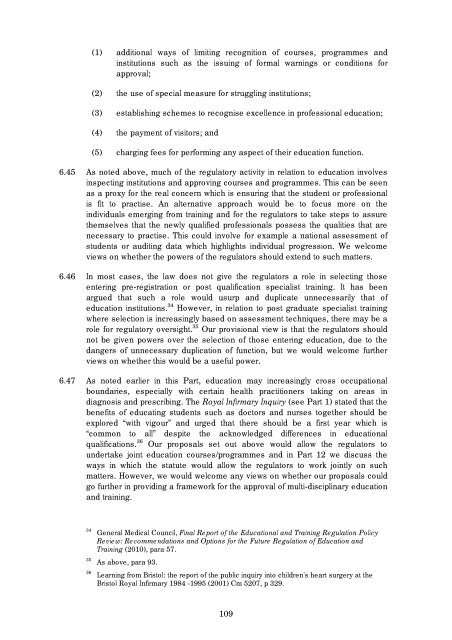Regulation of Health and Social Care Professionals Consultation
Regulation of Health and Social Care Professionals Consultation
Regulation of Health and Social Care Professionals Consultation
You also want an ePaper? Increase the reach of your titles
YUMPU automatically turns print PDFs into web optimized ePapers that Google loves.
(1) additional ways <strong>of</strong> limiting recognition <strong>of</strong> courses, programmes <strong>and</strong><br />
institutions such as the issuing <strong>of</strong> formal warnings or conditions for<br />
approval;<br />
(2) the use <strong>of</strong> special measure for struggling institutions;<br />
(3) establishing schemes to recognise excellence in pr<strong>of</strong>essional education;<br />
(4) the payment <strong>of</strong> visitors; <strong>and</strong><br />
(5) charging fees for performing any aspect <strong>of</strong> their education function.<br />
6.45 As noted above, much <strong>of</strong> the regulatory activity in relation to education involves<br />
inspecting institutions <strong>and</strong> approving courses <strong>and</strong> programmes. This can be seen<br />
as a proxy for the real concern which is ensuring that the student or pr<strong>of</strong>essional<br />
is fit to practise. An alternative approach would be to focus more on the<br />
individuals emerging from training <strong>and</strong> for the regulators to take steps to assure<br />
themselves that the newly qualified pr<strong>of</strong>essionals possess the qualities that are<br />
necessary to practise. This could involve for example a national assessment <strong>of</strong><br />
students or auditing data which highlights individual progression. We welcome<br />
views on whether the powers <strong>of</strong> the regulators should extend to such matters.<br />
6.46 In most cases, the law does not give the regulators a role in selecting those<br />
entering pre-registration or post qualification specialist training. It has been<br />
argued that such a role would usurp <strong>and</strong> duplicate unnecessarily that <strong>of</strong><br />
education institutions. 34 However, in relation to post graduate specialist training<br />
where selection is increasingly based on assessment techniques, there may be a<br />
role for regulatory oversight. 35 Our provisional view is that the regulators should<br />
not be given powers over the selection <strong>of</strong> those entering education, due to the<br />
dangers <strong>of</strong> unnecessary duplication <strong>of</strong> function, but we would welcome further<br />
views on whether this would be a useful power.<br />
6.47 As noted earlier in this Part, education may increasingly cross occupational<br />
boundaries, especially with certain health practitioners taking on areas in<br />
diagnosis <strong>and</strong> prescribing. The Royal Infirmary Inquiry (see Part 1) stated that the<br />
benefits <strong>of</strong> educating students such as doctors <strong>and</strong> nurses together should be<br />
explored “with vigour” <strong>and</strong> urged that there should be a first year which is<br />
“common to all” despite the acknowledged differences in educational<br />
qualifications. 36 Our proposals set out above would allow the regulators to<br />
undertake joint education courses/programmes <strong>and</strong> in Part 12 we discuss the<br />
ways in which the statute would allow the regulators to work jointly on such<br />
matters. However, we would welcome any views on whether our proposals could<br />
go further in providing a framework for the approval <strong>of</strong> multi-disciplinary education<br />
<strong>and</strong> training.<br />
34 General Medical Council, Final Report <strong>of</strong> the Educational <strong>and</strong> Training <strong>Regulation</strong> Policy<br />
Review: Recommendations <strong>and</strong> Options for the Future <strong>Regulation</strong> <strong>of</strong> Education <strong>and</strong><br />
Training (2010), para 57.<br />
35 As above, para 93.<br />
36 Learning from Bristol: the report <strong>of</strong> the public inquiry into children's heart surgery at the<br />
Bristol Royal Infirmary 1984 -1995 (2001) Cm 5207, p 329.<br />
109
















